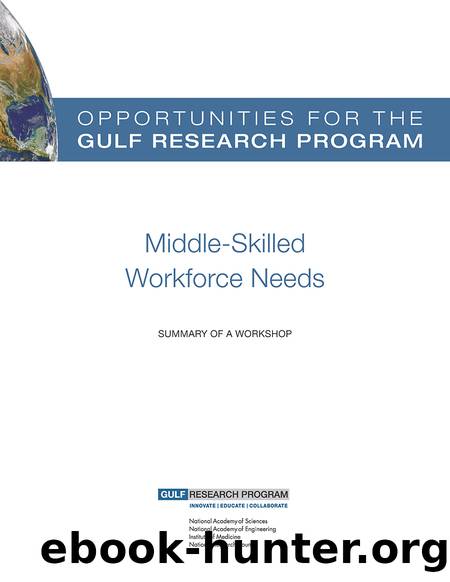Opportunities for the Gulf Research Program: Middle-Skilled Workforce Needs: Summary of a Workshop by Elizabeth O’Hare

Author:Elizabeth O’Hare
Language: eng
Format: epub
Publisher: The National Academies Press
Published: 2014-10-25T00:00:00+00:00
UNDERSTANDING THE WHOLE SYSTEM
Bill Raley, dean of industrial and technical programs at the College of the Mainland, which has received $5 million to create the Gulf Coast Safety Institute, described a specific example of how to build an oil safety system. The curriculum developed at the institute is about more than knowledge, he said. It is about comprehending what you know and tying the pieces together. The objective is to be aware of every aspect of every job and how that could affect the overall operation. Synthesis and evaluation make it possible to prevent accidents because people understand every aspect of every job, every component, and every unit in the process production facility.
Raley suggested that the current educational system funnels more students into traditional college pathways than the labor market requires, while at the same time, failing to provide all students with opportunities to learn more about the variety of career pathways that can lead to a successful adulthood.
Raley is responsible for a series of training programs in machining, welding, and other skills that are in high demand. These programs can have a big effect on safety, with a reduction both in accidents and in workmenâs compensation costs, he said.
Advisory groups from industry are critical, Raley noted. The people who hire the graduates of a program need to have a say in that program. Programs also need to be STEM-based, he said, because people need the knowledge to be able to synthesize information across fields, and to do that, they need mathematics, chemistry, and physics. Preparing people to work in high-tech, high-wage, high-demand fields requires academic rigor.
âAccidents donât happen. They are caused,â he concluded. âSomebody didnât do what they should have done or were supposed to have done. They did not follow procedures and did not understand the whole ramification of everything that has taken place on the floor of the rig or inside of a refinery.â
Download
This site does not store any files on its server. We only index and link to content provided by other sites. Please contact the content providers to delete copyright contents if any and email us, we'll remove relevant links or contents immediately.
| Automotive | Engineering |
| Transportation |
Whiskies Galore by Ian Buxton(41973)
Introduction to Aircraft Design (Cambridge Aerospace Series) by John P. Fielding(33108)
Small Unmanned Fixed-wing Aircraft Design by Andrew J. Keane Andras Sobester James P. Scanlan & András Sóbester & James P. Scanlan(32781)
Craft Beer for the Homebrewer by Michael Agnew(18222)
Turbulence by E. J. Noyes(8011)
The Complete Stick Figure Physics Tutorials by Allen Sarah(7358)
Kaplan MCAT General Chemistry Review by Kaplan(6918)
The Thirst by Nesbo Jo(6917)
Bad Blood by John Carreyrou(6604)
Modelling of Convective Heat and Mass Transfer in Rotating Flows by Igor V. Shevchuk(6423)
Learning SQL by Alan Beaulieu(6266)
Weapons of Math Destruction by Cathy O'Neil(6252)
Man-made Catastrophes and Risk Information Concealment by Dmitry Chernov & Didier Sornette(5987)
Digital Minimalism by Cal Newport;(5742)
Life 3.0: Being Human in the Age of Artificial Intelligence by Tegmark Max(5534)
iGen by Jean M. Twenge(5400)
Secrets of Antigravity Propulsion: Tesla, UFOs, and Classified Aerospace Technology by Ph.D. Paul A. Laviolette(5360)
Design of Trajectory Optimization Approach for Space Maneuver Vehicle Skip Entry Problems by Runqi Chai & Al Savvaris & Antonios Tsourdos & Senchun Chai(5056)
Pale Blue Dot by Carl Sagan(4987)
